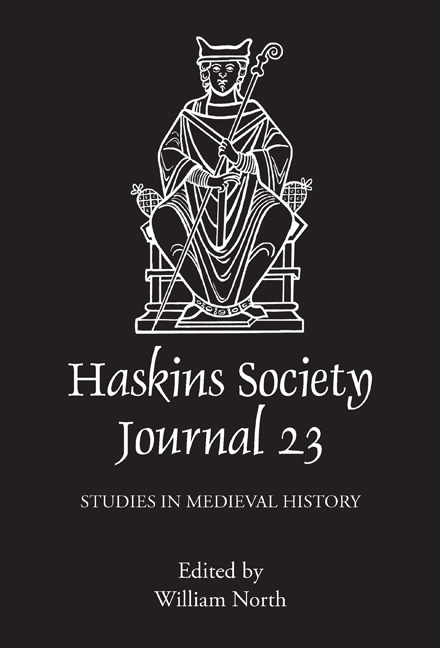Book contents
- Frontmatter
- Contents
- List of Figures
- Editor's Note
- Abbreviations
- 1 Francia and the History of Medieval Europe
- 2 Royal Control and the Disposition of Estates in Tenth-Century England: Reflections on the Charters of King Eadwig (955–959)
- 3 Denis Bethell Prize Essay: Frutolf of Michelsberg's Chronicle, the Schools of Bamberg, and the Transmission of Imperial Polemic
- 4 Manipulating Historical Memory: Cosmas on the Sees of Prague and Olomouc
- 5 Poetry and History: Baudry of Bourgueil, the Architecture of Chivalry, and the First Crusade
- Authors' Preface to Chapters 6 and 7
- 6 Men and Masculinities at the Courts of the Anglo-Norman Kings in the Ecclesiastical History of Orderic Vitalis
- 7 Men and Masculinities in William of Malmesbury's presentation of the Anglo-Norman Court
- 8 The Personnel of Comital Administration in Greater Anjou, 1129–1151
- 9 The Murder of Gilbert the Forester
- 10 The Object as Subject in Medieval Art
2 - Royal Control and the Disposition of Estates in Tenth-Century England: Reflections on the Charters of King Eadwig (955–959)
Published online by Cambridge University Press: 05 November 2014
- Frontmatter
- Contents
- List of Figures
- Editor's Note
- Abbreviations
- 1 Francia and the History of Medieval Europe
- 2 Royal Control and the Disposition of Estates in Tenth-Century England: Reflections on the Charters of King Eadwig (955–959)
- 3 Denis Bethell Prize Essay: Frutolf of Michelsberg's Chronicle, the Schools of Bamberg, and the Transmission of Imperial Polemic
- 4 Manipulating Historical Memory: Cosmas on the Sees of Prague and Olomouc
- 5 Poetry and History: Baudry of Bourgueil, the Architecture of Chivalry, and the First Crusade
- Authors' Preface to Chapters 6 and 7
- 6 Men and Masculinities at the Courts of the Anglo-Norman Kings in the Ecclesiastical History of Orderic Vitalis
- 7 Men and Masculinities in William of Malmesbury's presentation of the Anglo-Norman Court
- 8 The Personnel of Comital Administration in Greater Anjou, 1129–1151
- 9 The Murder of Gilbert the Forester
- 10 The Object as Subject in Medieval Art
Summary
This article examines the politics behind the disposition of lands in the tenth-century English kingdom through an analysis of the corpus of charters from the reign of King Eadwig. The record of land grants made during the reign of Eadwig, including a large proportion granted to laypeople, is rightly acknowledged to be remarkable in the Anglo-Saxon period, since such a comparatively large number of charters was issued within a short period of time. In the evidence provided by sources associated with contemporary monastic reforms the king and his associates are portrayed as using lands, including church lands, in an all but unrestrained manner during a reign often noted for its iniquities. In much modern scholarship, however, the use of landed property during Eadwig's reign has instead been considered in relation to his composition of a new court, the members of which benefited from these lands. In a recent discussion of the maintenance of royal authority in the early Middle Ages, Chris Wickham uses the reign of Eadwig to show the manner in which Anglo-Saxon royal power was able to survive when kingship in the tenth-century West Frankish kingdom was not. Yet this survival was, Wickham argues, despite what might appear to have been an excessive number of land grants made during Eadwig's reign, a volume that would not be seen again in Europe until the twelfth century.
- Type
- Chapter
- Information
- The Haskins Society Journal 232011. Studies in Medieval History, pp. 23 - 50Publisher: Boydell & BrewerPrint publication year: 2014



